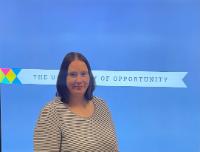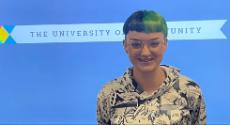The BA (Hons) Special Educational Needs, Disability and Inclusion Studies (SENDIS) is designed to help you to develop the skills, knowledge, and confidence to work in special and inclusive education and to represent and support other disadvantaged groups in society. The course is Ideal for those new to this field, as well as for experienced individuals seeking further professional development. During your course, as a SENDIS student, you will help you develop the understanding and competence required for a range of careers working with children, young people, adults, their families, and services that support them. You will have opportunities to consider a variety of issues and perspectives surrounding work with, and support for, disabled people and other vulnerable groups, and which as future professionals you will need to be able to recognise and address.
The course at level 4, 5 and 6 offers a unique blend of theories and practices in relation to Special Educational Needs, Disability, and Inclusion. You will study current policies, procedures, and practice to develop inclusive professional and social approaches. As you progress through your degree you will have opportunities to develop your critical capabilities through the selection, analysis, and synthesis of relevant perspectives, and be able to justify different positions on matters relating to special educational needs, disability, and inclusion.
We recognise that you will have a unique learning journey and we will maximise your potential by targeted academic and pastoral support and by taking part in a range of learning activities and assessments, such as presentations, essays, reflective journals, report writing and peer mentoring, some of them optional. Work placements are part of the course and can be completed in a variety of educational and community settings. In some circumstances, an international placement may be negotiated with a host institution. These placements will allow you to develop and enhance your professional skills, such as organisation, time management and communication, and to strengthen your confidence in supporting children or adults with additional needs.
The BA (Hons) SENDIS can be studied PART-TIME which includes daytime sessions. However, if you are a practitioner and would like to study more flexibly for example in the evening, we offer part time Foundation Degree Supporting Children in Primary Education at our college partners. After completing your part time Foundation degree, you can then top up to a final year of a part- time BA degree course to gain your full honours degree.
This degree sits within the exciting range of Education and SENDIS courses we offer within the School of Education.


/prod01/wlvacuk/media/departments/digital-content-and-communications/images-2024/240328-Varsity-Line-Up-Resized.jpg)
/prod01/wlvacuk/media/departments/digital-content-and-communications/images-18-19/220325-Engineers_teach_thumbail.jpg)
/prod01/wlvacuk/media/departments/digital-content-and-communications/images-2024/240515-Spencer-Jones-Award-Resized.jpg)
/prod01/wlvacuk/media/departments/digital-content-and-communications/images-2024/240320-Uzbekistan-Resized.jpg)
/prod01/wlvacuk/media/departments/digital-content-and-communications/images-2024/240229-The-Link-Resized.jpg)
/prod01/wlvacuk/media/departments/digital-content-and-communications/images-2024/240516-Andy-Gibson-Resized.jpg)





